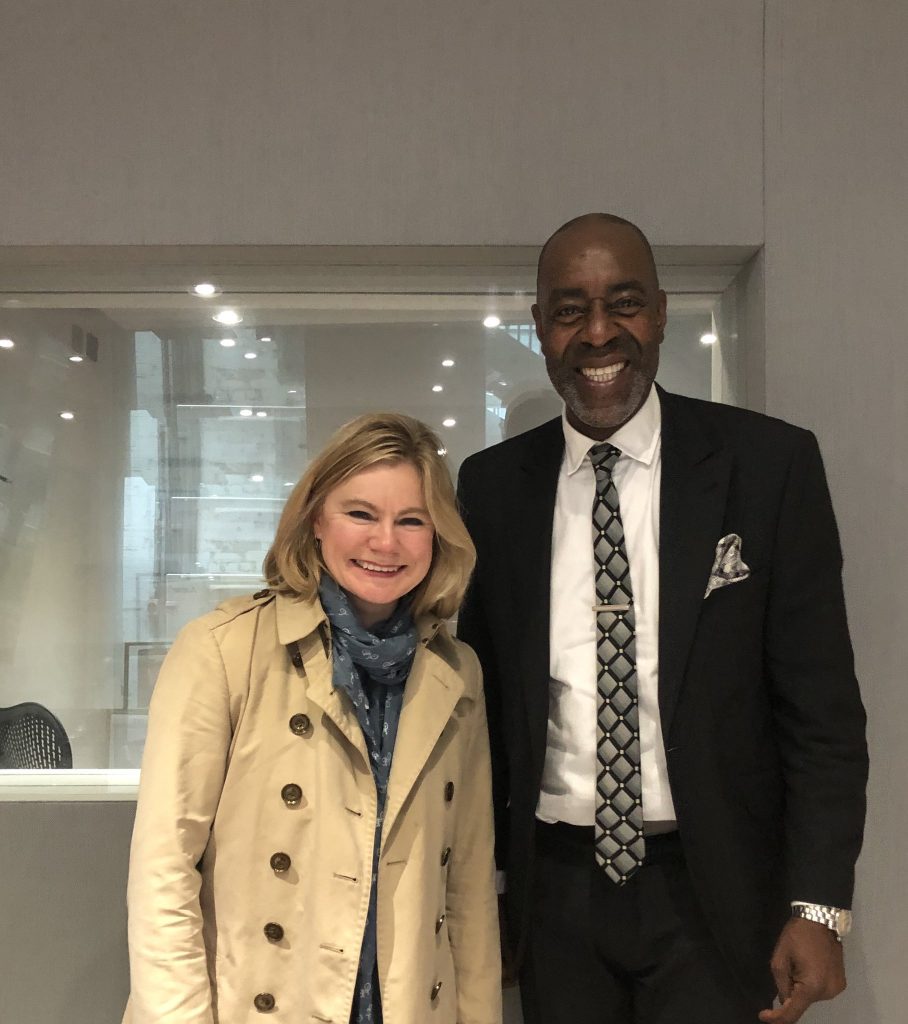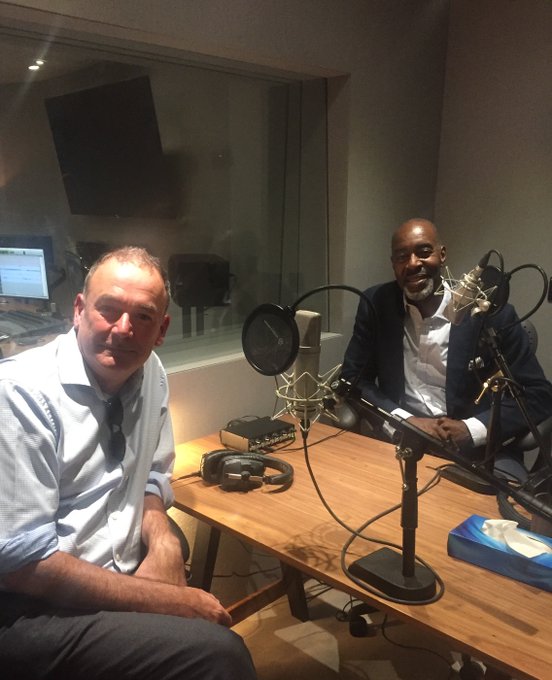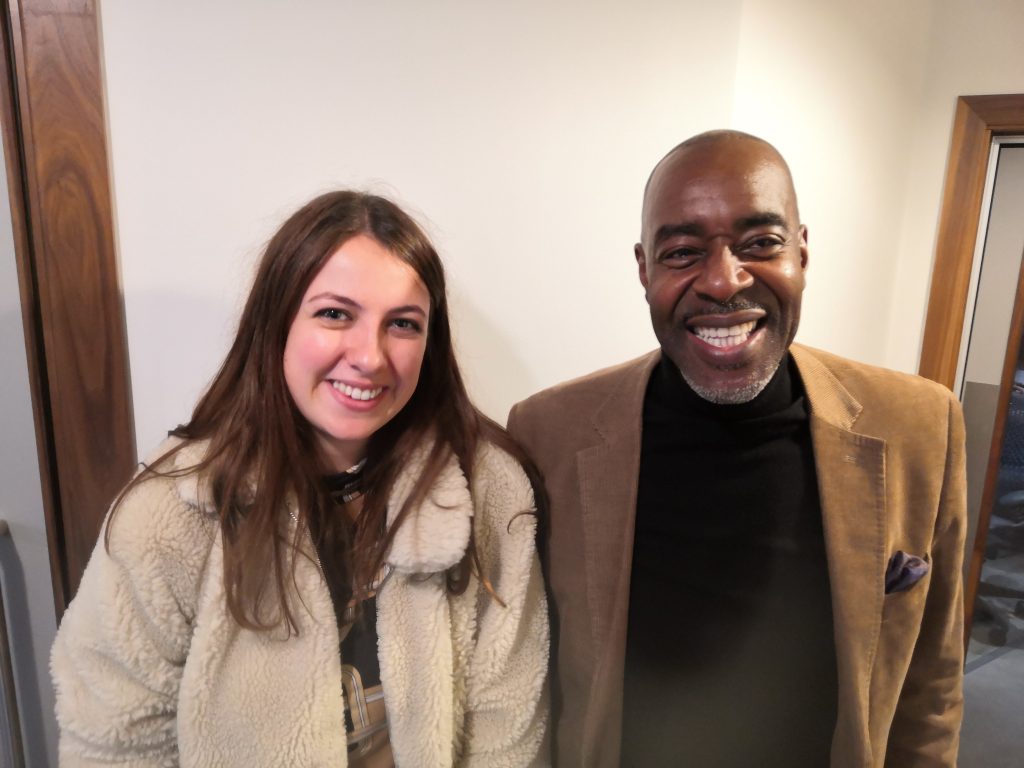In recent years social mobility has emerged from it’s past as a purely academic way of talking about the changing class status of people to a catch-all phrase denoting the many ways society must change to become more equal. This transformation has seen the term catapulted into the public consciousness, but the precise meaning and value of the term remains somewhat divisive. Indeed, the Labour Party recently shifted their focus from social mobility to social justice as a deliberate contrast to generations of government policy, including their own.

Tunde with Justine Greening MP
At its core the debate around social mobility revolves around the perception that, as a term, it has no in-built assurance that it is always positive. Critics point out that people are generally referring to the benefits of upward mobility without acknowledging that, for that to exist, there must also be downwards mobility. An additional criticism is that far from making society more equal, social mobility induces a system of cherry-picking the most talented and malleable people, while the remainder of the working class continue to suffer injustice and oppression.
For organisations such as ours, a grassroots social mobility charity that has been changing the lives of people from lower socio-economic backgrounds for over 26 years, this debate is somewhat irrelevant. Anyone who has worked in this sphere will know that, when you are trying to raise the aspirations of young people who have been fed a narrative of no hope, the semantics of mobility or justice do not matter – we simply want to see people living purposeful lives.

Mid-recording with Jon Cruddas MP
In order to move the social mobility conversation on and have more of a direct impact on young people across the country, in 2017 we launched the UK Social Mobility Awards. Celebrating the success of organisations and individuals for their social mobility initiatives, the Awards also serve as a beacon for the wider movement, bringing together people from a range of industries and locations for a common cause. This was never more evident than at the Social Mobility Business Seminar, when over 100 executives from business, government and the third sector gathered for an honest, uncompromising discussion on social mobility best practice and how organisations can most effectively implement cultural change. The Awards have been a huge success and, now in their third year, are serving as a barometer for organisational change across the country.
Phase two of moving the conversation on comes in the form of the Social Mobility Podcast. Launched in June, the Podcast centres around conversations between our Founder and CEO, Tunde Banjoko OBE, and some of the UK’s leading social mobility luminaries. It is here, in this format, that the discussion around social mobility can flourish uninhibited. With guests ranging from Rt Hon Justine Greening MP, Founder of the Social Mobility Pledge, to Kwame Kwei-Armah, Artistic Director of the Young Vic Theatre, the podcast encompasses political, creative and commercial visions of the future.
Indeed, the most interesting aspect of the podcast is that the breadth of perspective becomes crystallised into a unifying vision. The comments of Sir Ken Olisa OBE, Chair of Restoration Partners and Lord Lieutenant of Greater London – a man who made his name and fortune in the ruthless world where technology and merchant banking collide – on the “competitive advantage” of a successful social mobility strategy feed directly into Kwei-Armah’s observation that “diversity in our sector is not about philanthropy, it’s an economic imperative.”

A sneak peak of what’s to come with Lucy Martin
What is perhaps less surprising is how the personal experiences of Justine Greening MP – who grew up in Rotherham and went to comprehensive school – on the dearth of opportunity in social mobility cold spots matches the research of Carys Roberts, Chief Economist at the Institute for Public Policy Research & Head of the Centre for Economic Justice, who notes that “most economic gains have gone to people already at the top.” For an issue that is often branded as divisive, it is significant to know that the experts do generally agree, both on the causes of unequal opportunities and the strategies required to break the chain.
In modern Britain, we are constantly told that our country has never been more divided. Ideological splits and identity politics have, we are told, caused such mistrust that it is now impossible for the country to unilaterally support a movement. The Social Mobility Podcast tells us differently. It tells us that, regardless of your background and experience, we can all get behind the idea that every person in this country deserves the same opportunity to live a purposeful, fulfilling life. By having candid conversations and taking direct action we can turn the tide of social mobility stagnation.
Listen now to join the movement: https://www.socialmobility.fm/
The Social Mobility Podcast is available on Itunes, Spotify, Overcast, Castbox and many more platforms.
Upcoming episodes
Lucy Martin
Previous episodes
Justine Greening MP
Kwame Kwei-Armah
Sir Kenneth Olisa OBE
Carys Roberts
Sir Ian Powell
Jon Cruddas MP
Dame Martina Milburn
For all the latest updates, follow the Social Mobility Podcast on Twitter, here.
Follow Making The Leap on social media for all the latest news and updates.
